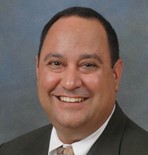
Florida’s Board of Governors unanimously selected Ray Rodrigues, a former Republican state senator and Director of Interagency Partnerships at Florida Gulf Coast University, as the new chancellor. He has spent more than a decade in higher education but also has been a stalwart politician in the state, shepherding through several key bills under Gov. Ron DeSantis that deeply impact administrators, faculty and students.
The 52-year-old Rodrigues gave up his Southwest Florida seat in the state legislature in 2020 in hopes of landing the position. That became available when Marshall Criser III, the son of the former University of Florida president, said he would be exiting as chancellor in July after eight years. He was one of just two finalists for the spot, along with Emory University School of Theology Chief Business Officer Lori Cromwell. Rodrigues proved to be the better choice for the Board.
“You bring a very strong mix of experiences, both personal and professional, including your experience in the private sector, your experience at the university level, your experience with budgets and your experience obviously in the legislature,” Board member Eric Silagy told Rodrigues during Wednesday’s announcement.
Aside from his six-year political run that included a stint as Majority Leader, Rodrigues also has served as budget manager for the College of Arts and Science and in community relations at FGCU. A first-generation student and graduate of Berry College in Georgia, he earned his master’s degree in public administration from Florida Gulf Coast. He said he had one simple mission as new chancellor.
“The goal is for us to provide the highest quality education at the most affordable price, with degrees that lead to employment,” Rodrigues said.
More from UB: DeSantis announces civics curriculum for high school and undergraduate students
Rodrigues will take over at a pivotal moment for higher education in the state, which has seen several new laws–including some he helped developed–reshape how institutions and their leaders can operate. Two that passed include one on “intellectual freedom and viewpoint diversity” in which state institutions must allow freedom of speech for all on campus (it is being challenged federally), as well as the controversial SB 7044, which forces colleges to change accreditors every cycle and tenured professors to undergo reviews every five years.
The new law has raised concerns that professors could be forced out if they speak freely, are critical of individual leaders or address topics such as critical race theory. Faculty organizations worry, too, that they could retire or exit for positions in other states, leaving institutions without some of their best and most experienced instructors.
“This should alarm all Florida faculty and students, as well as anyone considering working or studying in the state,” Irene Mulvey, president of the American Association of University Professors, said in a statement after the bill was passed. “Without the protections of academic tenure, teachers and researchers in higher education are subject to pressure and interference from donors, board members, corporations, and, of course, politicians, as we have seen recently at the University of Florida. The notion that faculty in higher education in Florida are indoctrinating students is ludicrous.”
While there is uncertainty about the future of the public higher education system in Florida, it is notable that the state was recently ranked No. 1 in the nation by U.S. News and World Report, including best on tuition and fees and second on two-year graduation rates. It was also No. 7 for least debt among students. However, when it comes to education attainment–or preparing students for success beyond college–it only landed at No. 29.
With that as a backdrop and with politics likely to play a part in the future, Andrew Gothard, President of the United Faculty of Florida, said he is hoping for the best for the state’s 12 public institutions and its many private colleges and universities.
“We have had our disagreements with Sen. Rodrigues in the past, especially regarding what makes good policy for Florida’s higher education system, but we hope to find common ground moving forward with him as Chancellor,” Gothard told University Business. “After all, we should all want the same thing, which is good, solid policies and programs that will continue to push Florida’s higher education system to being the best in the world. We hope to see Chancellor Rodrigues separate himself from the divisive politics promoted by Gov. DeSantis, namely by recognizing that Florida’s world-class higher education system acquired its status because of the continued commitment and efforts of its world-class faculty.”
That might be a longshot, but Gothard said it is important to keep politics from overrunning college campuses, and that includes both sides.
“We hope that he will use his position to stop efforts by Gov. DeSantis and his supporters to indoctrinate and intimidate Florida’s higher ed students and faculty into expressing and believing only conservative positions on key issues,” Gothard said. “As far as UFF is concerned, all are welcome in Florida’s college and university classrooms. The diversity of our higher education system—political, social, or otherwise—is a key part of its strength. We need a Chancellor who both recognizes and promotes these facts, now and into the future. We sincerely hope that Ray Rodrigues can be that kind of Chancellor.”
Gothard said he plans to connect with Rodrigues to talk about how they can all work together in the future.
“I will be reaching out to the new Chancellor in order to start a conversation about these issues and in hopes of finding a productive working relationship moving forward,” he said. “However, these hopes and efforts do not, in any measure, undermine UFF’s commitment to fully oppose policies and procedures that will actively harm higher education students, faculty, and staff, as well as the communities our campuses support.”



